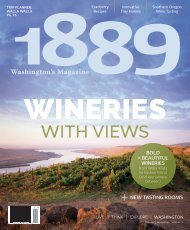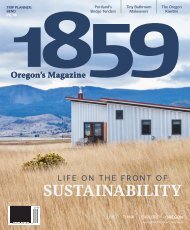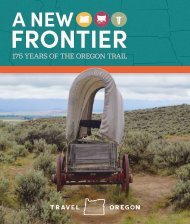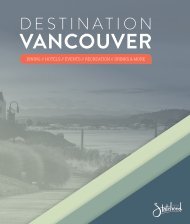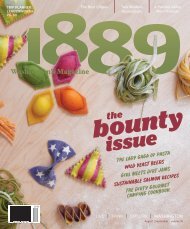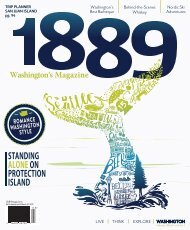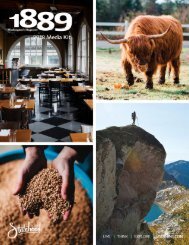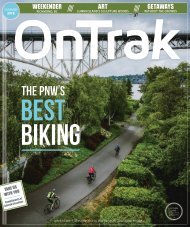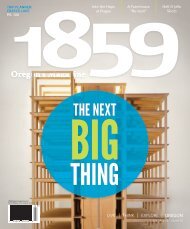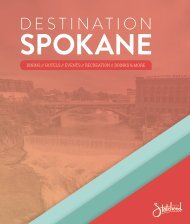You also want an ePaper? Increase the reach of your titles
YUMPU automatically turns print PDFs into web optimized ePapers that Google loves.
game changer<br />
Abdul Wali and his daughter Marghalara<br />
at their apartment. The family of five<br />
arrived in late 2015 from Afghanistan.<br />
Wali was an interpreter for the U.S.<br />
military, which put his family in danger<br />
of retaliation by the Taliban.<br />
World Relief Seattle<br />
Open Arms,<br />
Open Doors<br />
Lending a warm welcome<br />
to Washington newcomers<br />
written by Corinne Whiting<br />
AT A TIME when many in this country seem to be slamming<br />
doors on newcomers, others are opening theirs even wider. Take<br />
World Relief, for example, the largest refugee resettlement agency<br />
in the state.<br />
World Relief’s three offices (in Seattle, Tri-Cities and Spokane)<br />
resettle the majority of refugees in Washington, and the Seattle office,<br />
opened in 1979, is the largest resettlement office of any agency in<br />
the state. Last fiscal year, Washington came in at number four in the<br />
country, resettling 5 percent of all refugees who arrived nationwide.<br />
In 2017, World Relief Seattle resettled and served 1,076 individuals,<br />
and that’s only factoring new arrivals. (Programwide, it served 4,000.)<br />
The organization currently works with individuals from about twenty<br />
countries; most are foreign-born refugees, while others are asylum<br />
seekers or those affected by human trafficking.<br />
While the stats impress, hearing real-life tales of heartache,<br />
perseverance and triumph leave deeper impressions. World Relief<br />
relies heavily on volunteers; last year it received 400 applications<br />
between <strong>Feb</strong>ruary and April—“a great problem to have,” said volunteer<br />
coordinator Robbie Adams.<br />
Adams explained that, while the main goal is transformative, longterm<br />
relationships, the “immediate, more practical challenge” involves<br />
finding folks a home. “It’s a tough balance between the Puget Sound<br />
region offering bountiful education and job opportunities, yet being<br />
able to find affordable housing here,” he said.<br />
The organization gathers household items, from large furniture to<br />
basic necessities like silverware, and sets up welcoming spaces. It also<br />
keeps an Amazon registry, so anyone can donate goods, from vacuums<br />
to rice cookers. In-kind donations coordinator Elijah Knepper of World<br />
Relief said that most people don’t understand the privilege of simply<br />
having a safe place to sleep. “[They’ve] been through experiences we<br />
cannot even begin to imagine, and now [they] can just lie down and<br />
rest,” he said.<br />
Adams explained the continuum from greeting a family at Sea-Tac<br />
to staying connected for years to come. “Our employment, extended<br />
casework, women’s sewing class, immigration legal services, refugee<br />
and immigrant community garden, and youth programs allow us to<br />
serve the refugee population from arrival to citizenship, usually a fiveto<br />
six-year journey,” he said. “It’s not just about giving material goods,<br />
but a holistic approach that includes creating friendships.”<br />
After helping newcomers integrate into their neighborhoods,<br />
World Relief aims to empower them. The numbers prove they’re<br />
doing something—or many things—right. In 2016, 244 people found<br />
employment with 114 companies, 67 percent of students made a fulllevel<br />
gain within six weeks of English class, and volunteers were paired<br />
with ninety-six refugee families as cultural companions or host homes.<br />
“The art is figuring out the balance between serving this vulnerable<br />
population and pushing them toward self-sufficiency,” Adams said.<br />
“We’re happy to not just get people surviving, but to get them thriving<br />
and rooted in communities.”<br />
For those wanting to get involved, Adams simply advises, “Be<br />
willing to show up open-minded to meet folks from around the<br />
world.” “With all the divisiveness and fear right now,” he added,<br />
“we’ve met that by building bridges and friendships … establishing<br />
those face-to-face relationships. Even in this climate, it’s been<br />
encouraging to see so many rallying to the cause of welcoming our<br />
new neighbors.”<br />
44 <strong>1889</strong> WASHINGTON’S MAGAZINE FEBRUARY | MARCH <strong>2018</strong>




